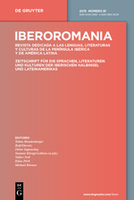
IBEROROMANIA
Scope & Guideline
Navigating the Rich Tapestry of Romance Linguistics and Literature
Introduction
Aims and Scopes
- Interdisciplinary Literary Analysis:
The journal emphasizes the integration of literary studies with cultural, historical, and sociopolitical contexts, particularly in relation to Ibero-Romance languages. - Exploration of Colonial and Post-Colonial Narratives:
A significant focus is placed on the examination of colonial history and its lingering effects in contemporary literature, addressing themes of memory, identity, and representation. - Historical Contextualization of Literature:
IBEROROMANIA often situates literary works within their historical frameworks, analyzing how historical events shape and are reflected in literary expressions. - Cultural Exchange and Interaction:
The journal explores the interactions and exchanges between different cultures, particularly those of the Iberian Peninsula and Latin America, emphasizing the complexities of identity and belonging. - Innovative Methodologies:
Utilizing a range of methodologies, including ecocriticism, post-colonial theory, and sociolinguistic approaches, the journal seeks to offer fresh insights into both classical and contemporary texts.
Trending and Emerging
- Decolonization and Memory Studies:
Recent publications increasingly address the theme of decolonization, particularly in relation to how memory is constructed and represented in literature, reflecting a broader societal awareness of historical injustices. - Ecocriticism and Environmental Literature:
There is a growing trend toward ecocritical readings of literature, exploring the relationship between culture and the environment, particularly within the context of the Anthropocene. - Contemporary Identity and Migration Issues:
Emerging themes related to identity in the context of migration and cultural diasporas are gaining traction, reflecting current global socio-political dynamics. - Intermediality and Transmedial Narratives:
The exploration of intermediality—how literature interacts with other media forms—is becoming more prevalent, highlighting the complexities of narrative in a digital age. - Cross-Cultural Dialogues:
The journal is increasingly publishing works that examine cross-cultural dialogues, particularly between Latin American and European contexts, fostering a deeper understanding of cultural interconnectivity.
Declining or Waning
- Traditional Canonical Works:
There seems to be a declining emphasis on the analysis of traditional canonical texts from the Iberian literary canon, as newer works and contemporary literature gain prominence. - Historical Linguistics:
Research focusing specifically on historical linguistics and the evolution of language within Ibero-Romance contexts appears to be waning, with fewer papers dedicated solely to this area. - Static Cultural Studies:
There is a noticeable decrease in studies that treat cultures as static entities, with a shift towards more dynamic and fluid interpretations of cultural identity. - Gender Studies in Historical Contexts:
While gender studies remain relevant, the specific focus on historical contexts and figures in gender studies seems less frequent, as contemporary issues take precedence. - Single-Narrative Focus:
Papers concentrating on singular narratives or isolated literary figures are becoming less common, with a trend towards more comparative and thematic analyses.
Similar Journals
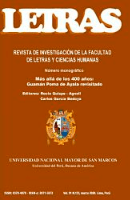
Letras-Lima
Connecting scholars through cultural exchange.Letras-Lima is a prestigious open-access journal published by the Universidad Nacional Mayor de San Marcos in Peru, dedicated to advancing the fields of Arts and Humanities, Cultural Studies, Linguistics, and Literature. Since its transition to open access in 2003, it has established itself as a vital resource for scholars and practitioners alike, aiming to foster intellectual discourse and cultural exchange across disciplines. The journal boasts a commendable impact factor, with a range of Q2 to Q4 quartiles within its respective categories for 2023, reflecting its commitment to quality and relevance. Notably, it holds a significant role in promoting literature and literary theory, currently ranking 240 out of 1,106 in the category, indicating it occupies the 78th percentile of publications in its field. Addressing the complexities and nuances of language and culture, Letras-Lima serves as an essential platform for researchers, professionals, and students seeking to disseminate and engage with transformative ideas that shape our understanding of society and identity.

Romanic Review
Illuminating Interdisciplinary Dialogues in the Arts and HumanitiesThe Romanic Review, published by Duke University Press, stands as a significant scholarly platform in the field of Romance languages and literature. With its ISSN 0035-8118 and E-ISSN 2688-5220, this journal has been serving the academic community since its inception and will continue its contribution until 2024. Situated in the United States, it has carved out a vital niche in the Arts and Humanities, currently falling within the Q3 quartile as per the 2023 rankings. Although it operates under a traditional subscription model, its focus on disseminating critical and innovative research makes it an indispensable resource for scholars and students alike. The Romanic Review is dedicated to fostering academic discussions that bridge interdisciplinary gaps, making it a cornerstone reference for anyone engaged in the study of Romance cultures, linguistics, and literary studies.
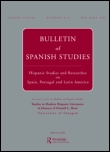
Bulletin of Spanish Studies
Advancing Scholarly Discourse in Spanish StudiesBulletin of Spanish Studies is a prominent academic journal dedicated to the exploration and discourse of Spanish studies within the diverse realms of Cultural Studies and Literature and Literary Theory. Published by Routledge Journals, Taylor & Francis Ltd, this journal serves as a crucial platform for scholars, researchers, and students to disseminate their findings and engage in scholarly debates related to Spanish literature, culture, and linguistics. With an emphasis on high-quality, peer-reviewed research, the journal holds a reputable Q3 ranking in Cultural Studies and a commendable Q2 ranking in Literature and Literary Theory, reflecting its significant impact within the academic community. The Bulletin is indexed in notable databases, achieving a rank of #314 out of 1106 in Literature and Literary Theory and #738 out of 1304 in Cultural Studies, signaling its vital role in advancing knowledge in these fields. Although it does not currently offer open access options, the journal remains an essential resource for those passionate about the study of Spanish culture and literature from 2010 to 2024 and beyond.

REVUE DES LANGUES ROMANES
Advancing Interdisciplinary Insights in LinguisticsREVUE DES LANGUES ROMANES is an esteemed academic journal published in France, dedicated to the study of Romance languages, linguistics, and literary theory. With an ISSN of 0223-3711, this journal has transitioned to an Open Access model since 2022, broadening accessibility and encouraging collaborative research across disciplines. It serves as a platform for researchers, professionals, and students to explore the intricacies of language and literature within the broader context of arts and humanities. Notably, REVUE DES LANGUES ROMANES has achieved Q4 quartile rankings in 2023 for its contributions to Archaeology, Linguistics, and Literature, reflecting its commitment to fostering scholarly dialogue, despite its emerging status in the academic landscape. With a focus on interdisciplinary approaches, the journal invites innovative insights and critical analyses that further understanding in these fields, promoting the depth and richness of Romance languages and their cultural implications.

ENGLISH LANGUAGE NOTES
Illuminating the Complexities of Language and LiteratureENGLISH LANGUAGE NOTES is a premier journal published by the University of Colorado, dedicated to the field of literature and literary theory. With a strong impact in academia, it holds a prestigious Q2 ranking in the 2023 category, emphasizing its importance among scholarly publications. The journal, indexed under ISSN 0013-8282 and E-ISSN 2573-3575, has been a crucial resource since its inception in 1969, featuring converged years from 1969, 1977, and 1982, through to 2024. The editorial board promotes rigorous scholarship and encourages contributions that explore the complexities of the English language across diverse literary contexts. While it does not offer open access, ENGLISH LANGUAGE NOTES remains a vital source for researchers, professionals, and students invested in the sustained exploration of literary arts, evidenced by its strong Scopus ranking in the 79th percentile in its field. For those committed to advancing literary scholarship, this journal serves as an invaluable platform for discussion and dissemination of influential ideas.

Estudios Romanicos
Illuminating the Intersection of Language and LiteratureEstudios Romanicos, published by the Universidad de Murcia, is an esteemed open-access journal that has significantly contributed to the fields of Linguistics, Language, Literature, and Literary Theory since its inception in 1978. With an impact factor that elevates it to Q3 in Linguistics and Language and Q2 in Literature and Literary Theory as of 2023, this journal ranks impressively within its categories—placing it in the 76th percentile for Literature and Literary Theory, making it an essential resource for academic discourse. Based in Murcia, Spain, the journal embraces an open-access model, ensuring that its rich content is accessible to a global audience—fostering collaboration and cross-disciplinary research. The convergence of knowledge from diverse linguistic and literary perspectives allows researchers, professionals, and students alike to engage with cutting-edge scholarship and extend the boundaries of their own studies.

Expressions maghrebines
Empowering Research in Maghreb Literary TraditionsExpressions maghrebines, an esteemed journal published by Florida State University, fosters scholarly dialogue in the realm of Literature and Literary Theory, focusing on the vibrant narratives and critical discourses emerging from the Maghreb region. Established in 2002, this journal has become a vital resource for researchers, professionals, and students, illustrating a commitment to exploring contemporary trends in Francophone literature. With an impressive Q3 rank in 2023, it stands within the top echelon of its category, offering insightful analyses and innovative perspectives to enhance academic understanding. Though not an open-access publication, Expressions maghrebines is indispensable for those seeking to delve into the cultural and intellectual currents that shape Maghreb literary landscapes, thus reinforcing its position as a significant contributor to the academic community's exploration of Francophone studies.
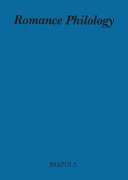
ROMANCE PHILOLOGY
Bridging Theory and Practice in Romance PhilologyROMANCE PHILOLOGY is a distinguished academic journal dedicated to the exploration of language, literature, and linguistic theory within the Romance language family. Published by BREPOLS PUBL, it offers a platform for scholars, researchers, and practitioners to disseminate their findings and engage with the latest developments in these fields. The journal's impact factor reflects its standing, positioned within the Q4 category in Linguistics and Language and Q3 in Literature and Literary Theory for 2023, making it an essential resource for those studying Romance philology. Although coverage in Scopus was discontinued in 2021, the journal maintains a commitment to rigorous academic standards and comprehensive peer-review processes. With a broad scope encompassing theoretical and practical aspects of Romance languages and literatures, ROMANCE PHILOLOGY invites contributions that push the boundaries of knowledge and enrich the academic dialogue surrounding these vital areas of study. For those passionate about linguistic and literary pursuits, this journal stands as a significant gateway into the evolving discourse of Romance studies.
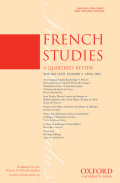
FRENCH STUDIES
Advancing Interdisciplinary Insights in French StudiesFRENCH STUDIES is a premier academic journal published by Oxford University Press, dedicated to advancing the fields of Cultural Studies, History, Linguistics, and Literature. Established in 1947, the journal has become a significant platform for interdisciplinary research, reflecting on the complexity and richness of French cultural and literary heritage. With an impact factor that positions it in Quartiles Q2 and Q3 across various categories, including Literature and Literary Theory, FRENCH STUDIES is recognized for its scholarly contributions and insights into historical narratives, linguistic developments, and cultural analyses. The journal does not currently offer open access options, yet it remains an essential resource for researchers, professionals, and students seeking to deepen their understanding of French studies and its global implications. The journal's commitment to quality and intellectual rigor is evidenced through its Scopus rankings, making it a valuable asset for the academic community in the United Kingdom and beyond.

Listy Filologicke
Advancing Scholarly Discourse in the Heart of the Czech Republic.Listy Filologicke is a distinguished academic journal published by the Institute of Classical Studies at the Academy of Sciences of the Czech Republic, focusing on the interdisciplinary fields of History, Linguistics and Language, and Literature and Literary Theory. With an ISSN of 0024-4457 and an E-ISSN of 2570-9410, this journal has been a pivotal platform for scholarly discourse since its convergence years began in 2003. Notably, it holds a Q3 classification in History and Linguistics and Language, and a Q2 in Literature and Literary Theory as of 2023. Its rankings within Scopus illustrate its relevance and impact in academia, with noteworthy positions in the Arts and Humanities and Social Sciences categories. Researchers, professionals, and students will find Listy Filologicke an invaluable resource for exploring cutting-edge research, critical analyses, and discourse that contribute significantly to their respective fields. Based in the heart of the Czech Republic, it continues to promote scholarly excellence and foster international collaboration.